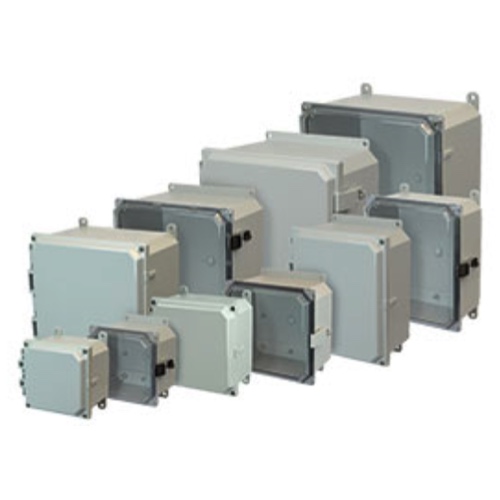Allied Moulded Polycarbonate Enclosures

RSP Supply carries a full line of Allied Moulded non-metallic polycarbonate enclosures designed to provide long-lasting protection and insulation for electrical and electronic equipment. These enclosures are built from thermoplastic resin processed through sheet extrusion or injection molding, resulting in a strong, impact-resistant structure that withstands tough environmental conditions.
Polycarbonate is corrosion-resistant and performs reliably across a temperature range of -31°F to 180°F, making these enclosures ideal for both indoor and outdoor applications. However, care should be taken to avoid abrasive cleaners or exposure to organic solvents and alkalis, as these can affect the surface integrity. Allied Moulded polycarbonate enclosures are an attractive, lightweight alternative to fiberglass models, offering similar protection while maintaining a modern appearance. The AMP Series POLYLINE enclosures are available in multiple sizes with solid or clear cover options, and metal or nonmetal snap latches for easy access and secure closure. Standard back panel mounting and provisions for adjustable hinged front panel installations make configuration simple for a variety of electrical setups.
FAQs
Q: What are Allied Moulded polycarbonate enclosures made from?
They are constructed from thermoplastic resin processed through sheet extrusion or injection molding, offering high strength and impact resistance.
Q: Are polycarbonate enclosures suitable for outdoor use?
Yes, these enclosures are resistant to corrosion and temperature extremes, making them ideal for outdoor electrical and industrial applications.
Q: What temperature range can Allied Moulded polycarbonate enclosures withstand?
They can operate within a temperature range of approximately -31°F to 180°F.
Q: How do polycarbonate enclosures compare to fiberglass models?
Polycarbonate enclosures provide similar durability and weather resistance but are often lighter, more impact-resistant, and have a cleaner aesthetic appearance.
Q: What configurations are available for Allied Moulded polycarbonate enclosures?
They are available with solid or clear covers, metal or nonmetal snap latches, and options for standard back panels or hinged front panel installations.
Why Buy Allied Moulded Polycarbonate Enclosures from RSP Supply
RSP Supply provides Allied Moulded polycarbonate enclosures that combine durability, corrosion resistance, and professional design. With fast shipping, competitive pricing, and knowledgeable support, we ensure you receive the right enclosure for any industrial or electrical application.

